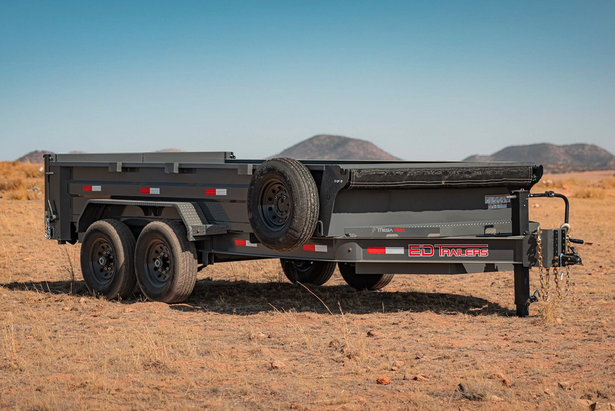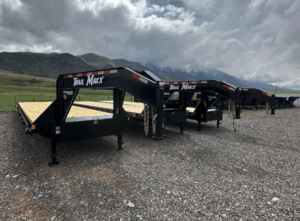Owning a trailer means dealing with tough roads, changing weather, and heavy loads.
If you’re hauling equipment to a job site, moving livestock, or towing toys out to the desert, keeping your trailer in good shape isn’t optional — it’s essential. Regular trailer maintenance not only keeps you safe, but also saves you money and extends the life of your trailer.
Let’s dive into what every trailer owner should know.
Why Regular Trailer Maintenance Matters
It’s easy to hook up your hitch ball and hit the road without thinking much about what’s happening underneath the trailer frame, until something goes wrong.
Maintenance is about protecting your trailer’s safety, saving money, and avoiding costly repairs. Faulty trailer brakes, worn trailer tires, or a loose coupler can turn a quick trip into a real hazard. Sticking to a consistent maintenance schedule helps you catch small problems before they turn into breakdowns.
Ignoring the moving parts on your trailer, from safety chains to suspension components, leads to wear, tear, and failure. Trailer lights might flicker, your trailer wheel bearings may seize, or a neglected breakaway cable could stop working altogether.
And over time, all of that adds up. Simple things like making sure your lug nuts are torqued or fasteners are secure can seriously extend the lifespan of your trailer.
General Maintenance Checklist
Every trailer is different, but there are a few universal maintenance checks every owner should stay on top of, no matter what you’re hauling.
Tires
Check tire pressure regularly, especially before long trips. Look for uneven wear, cracks in the sidewalls, or low tread depth. Don’t forget the spare. It should be just as road-ready as the rest.
Brakes
If your trailer has electric or hydraulic brakes, test them often. Squealing, pulling, or delayed response can all point to problems. Brake pads and drums need to be inspected and replaced as needed.
Lights and Wiring
Test all running lights, brake lights, and turn signals. Electrical issues are one of the most common reasons trailers get pulled over. Corrosion at the connectors or frayed wiring are common culprits.
Hitch and Coupler
Make sure your coupler locks securely onto your ball hitch. Check for rust, worn latches, or looseness in the assembly. A loose hitch can cause dangerous swaying or detachment.
Frame and Body
Walk around your trailer and look for cracks, rust, or bent parts. Keep an eye on welds, bolts, and stress points, especially if you’ve been hauling heavy loads or hitting rough terrain.
Bearings and Axles
Grease your wheel bearings regularly and inspect the axle housing for damage or leaks. Neglecting this can lead to overheated hubs and wheel failures — not fun on the side of I-15.
Keeping up with this checklist doesn’t take long, but it goes a long way in preventing bigger problems down the road.
Maintenance Tips by Trailer Type
Not all trailers are built the same, and neither are their maintenance needs. Here’s a quick breakdown of what to watch for based on the type of trailer you own.
Carhauler Trailers
Check that the ramps are in good shape and free from warping. Inspect tie-down points for wear or looseness. Brake lights should be bright and fully operational, especially if you’re hauling vehicles with limited visibility.
Deck Over Trailers
Because of their wider deck, it’s important to keep an eye on frame stress and decking integrity. Tighten all bolts on the decking and inspect the ramp hinges after heavy use.
Dump Trailers
Hydraulic systems are the big one here. Look for fluid leaks, test the lift regularly, and grease all moving joints. Make sure the tailgate latches securely and doesn’t stick open or closed.
Enclosed Trailers
Inspect door seals and roof seams to prevent water intrusion. Inside, look for signs of moisture damage, especially if you’re storing tools or equipment. Don’t forget the sidewalls. Tthey’re your first defense against the elements.
Equipment Trailers
Axles and tires take a beating with heavy loads, so check them more frequently. Reinforce the ramp hinges and welds, and make sure your load straps and anchor points can handle the weight.
Gooseneck Trailers
Check the coupler for tightness and rust, and inspect the gooseneck joint where it connects to the frame. This area absorbs a lot of road stress. Double-check electrical wiring running along the neck.
Tilt Trailers
Grease the pivot points and inspect hydraulic or mechanical tilt mechanisms. Make sure the tilt lock is secure and hasn’t loosened from vibration or use.
Utility Trailers
These trailers are versatile but often neglected. Check the flooring for rot or damage, especially if it’s wood. Ensure side rails are solid and the gate opens and locks properly.
Each trailer type has its own quirks, but regular inspections tailored to your model will help you spot problems early and keep things rolling.
Seasonal Maintenance Considerations
The different seasons can be tough on trailers, from freezing mountain mornings to scorching desert afternoons. Adjusting your maintenance routine to the time of year helps prevent issues that sneak up when the weather changes.
Winter Maintenance
Cold temps can stiffen tires, freeze fluids, and wear down batteries faster than usual. Before winter hits, check tire pressure. Cold air causes it to drop. Grease your axles and couplers to prevent seizing. If your trailer sits unused during the winter, clean it thoroughly, disconnect the battery, and cover any exposed wiring or connectors.
Also, watch for rust. Salt from icy roads can corrode frames and underbodies quickly, especially on utility or equipment trailers. After a snowy trip, rinse your trailer with fresh water to prevent long-term damage.
Summer Maintenance
Summer heat stresses tires, brakes, and electrical systems. High temperatures can cause tire blowouts if they’re over- or under-inflated, so check your pressure often. Make sure your brake system isn’t overheating, especially on long hauls through canyons.
For enclosed trailers, inspect seals and roof vents. Summer sun can dry them out and lead to leaks. UV exposure also fades decals, cracks plastic covers, and weakens rubber parts, so consider storing your trailer in the shade or under a cover when not in use.
Being proactive as the seasons change helps you avoid breakdowns and keeps your trailer ready for work or adventure year-round.
When to Seek Professional Help
Some maintenance tasks are quick DIY jobs, while others need a professional’s touch. Knowing when to call in the experts can save you time, money, and a whole lot of frustration.
Signs You Shouldn’t Ignore
If your trailer starts pulling to one side, making strange noises, or showing signs of uneven tire wear, those are red flags. Grinding brakes, flickering lights, or trouble with the hydraulic lift? Time to get it checked out. These are often signs of bigger problems under the surface.
Why Routine Servicing Matters
Even if nothing seems wrong, scheduling a professional inspection once or twice a year is a smart move. A trained technician can spot early signs of wear you might miss — like a cracked weld, worn axle, or slow electrical short. That kind of preventive maintenance keeps your trailer reliable and safe.
How Silverline Trailers Can Help
Silverline Trailers is a trusted partner for trailer owners across the country. With locations nationwide, our experienced teams understand the demands of local roads, regional weather, and real-world hauling. Whether you need a full-service checkup, a quick brake adjustment, or a hard-to-find replacement part, Silverline has the tools and know-how to keep you rolling.
If you’re unsure whether a problem is minor or major, don’t guess. Ask! A quick visit to the Silverline team could save you a costly breakdown later.
Keep Your Trailer Rolling — and Ready for Anything
Trailer maintenance is a smart investment in safety, performance, and peace of mind.
Our tips aren’t just for gearheads. They’re for anyone who relies on a trailer to get the job done.
If you’re ready to take the next step, consider scheduling a service appointment with Silverline Trailers or stopping by to ask a few questions. And if you’re thinking about upgrading or adding a new trailer to your fleet, check out our current inventory — there’s a good chance we’ve got exactly what you need.




